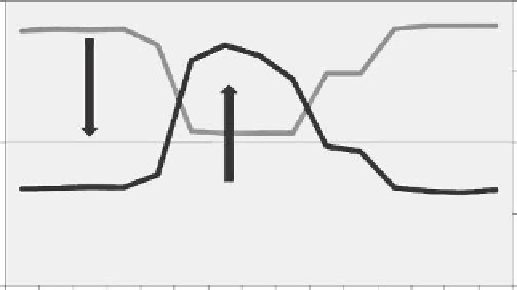Environmental Engineering Reference
In-Depth Information
400
16
Generation
14
38%
250
12
30%
Heat Rate
10
Cherokee Unit 4, Denver CO
100
8
Source: BENTEK Energy, CEMS
FIGURE 2.4
Impact of generation decline on heat rate.
from the plant is shown in the light gray line; the heat rate (MMBtu of
fuel per unit of generation) is shown in the dark gray line. Between 9:00
p.m. and 1:00 a.m., generation from Cherokee 4 fell from 370 to 260 MW
and then increased to 373 MW by 4:00 a.m. During the period in which
generation fell by 30%, heat rate rose by 38%. Heat rates are directly linked
to cycling: as coal plant generation falls, the heat rate begins to climb.
Initially, the heat rate climbs because generation is choked back and fewer
megawatts are produced by the same amount of coal. Later in the cycle,
the heat rate climbs further because more coal is burned in order to bring
the combustion temperature back up to the designed, steady-state rate; for
many hours after cycling, the heat rate is slightly higher than it was at the
same generation level before cycling.
As noted earlier, PSCO does not publish hourly wind generation data.
However, it publishes hourly generation data for coal plants through its
continuing emissions monitoring system (CEMS) reporting. Thus it is pos-
sible to examine the behavior of PSCO's coal plants as reflected by their
heat rates. Figure 2.5 compares the hourly heat rate versus generation for
all coal-fired plants in 2006 to their heat rates in 2008. The average heat rate
rose slightly, from 10.45 to 10.57, but overall the total system changed only
slightly.
These data, however, mask the impacts on specific facilities. For example,
Figure 2.6 compares the hourly heat rates for the Cherokee 4 boiler in 2006
and 2008. Each light gray dot represents the generation and associated heat
rate for each hour of operation in 2006 and 2008. The dark gray lines indicate
the average heat rates for the boiler during the year. A comparison of the two
graphs shows that in 2008 the Cherokee plant was operated in a manner that

